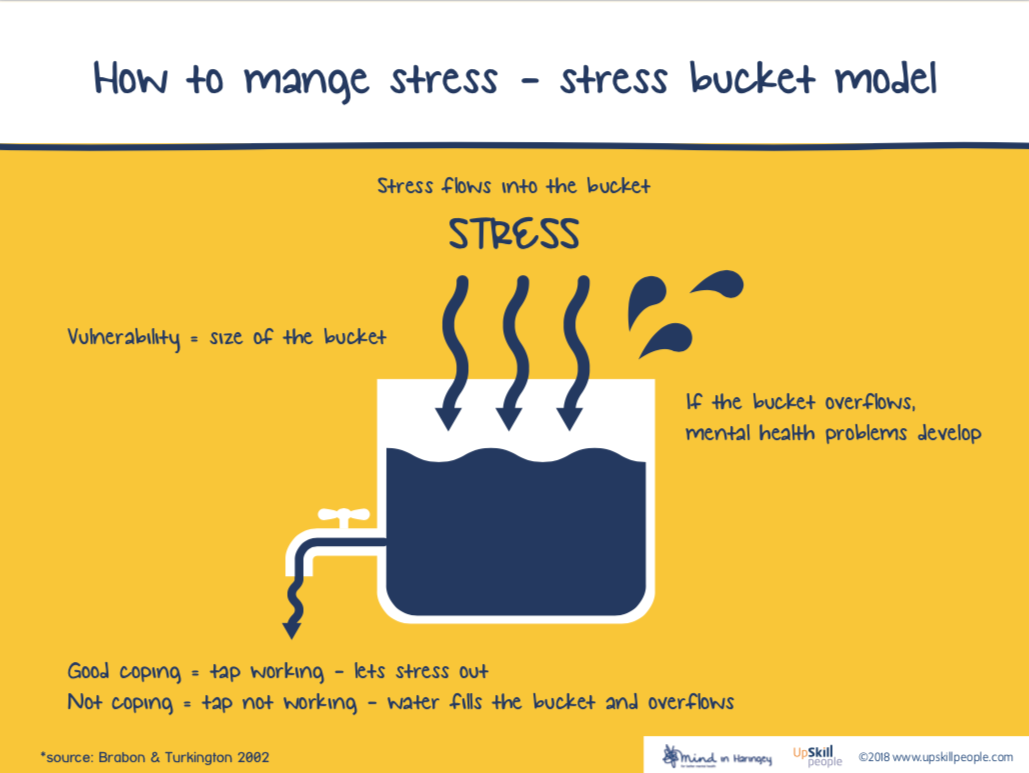Hands up if you don’t have any stress in your life? No…… I didn’t think so!
The impact of stress on our lives is huge and “I’m stressed” appears to be a phrase on the tip of everyone’s tongues these days. What exactly is it and how does it affect us?
Stress is our body’s response to mental or emotional pressure. It can be classed as how much you feel overwhelmed or unable to cope as a result of lots of pressures. Despite popular belief we all need a little bit of stress, otherwise we wouldn’t get motivated in the mornings or hit that work deadline.
Chronic stress on the other hand can lead to psychological problems and affect all areas of your life. It also plays a key role in the development of anxiety and depression if it becomes unmanageable.
Stress becomes a problem when the frequency of it increases and it is not managed properly. This can lead to a variety of health problems and poor mental wellbeing.

So, the question is in the fast-paced modern era and an ‘always available’ culture, how can we manage our stress better and improve our mental wellbeing?
We all have a stress bucket that is unique to us. Whenever I start to feel overwhelmed or stressed, I use the stress bucket exercise to identify and manage my own stress. This really helps me to rebalance by identifying the current things in my life that are affecting me. If you want to have a go at this, then it may help reduce your stress levels too?
What is the stress bucket exercise I hear you ask?

Visualise your own bucket with a tap on the side of it. The tap is a metaphor for coping strategies. Don’t worry about the size of it as everyone’s bucket will be different. What does matter is how FULL your bucket is. Everything that causes you stress flows into the bucket causing it to rise. If you do not use the tap to release some of the stress, then the bucket will overflow. When the bucket is spilling over, you may display signs of stress through being short tempered or anti-social.
Take some time to answer the following questions about the contents of your own bucket. Be aware that having a mental health issue means your stress bucket may be shallower, which means your bucket can fill up quicker.
- What makes you feel stressed? (job, family life, relationships, money).
- What signs are there that your stress bucket is overflowing? (being angry, sad, short tempered or unhappy).
- How do you currently relieve any stress? (socialising, exercising, drinking alcohol, meditation, reading, eating out).
Answering these questions will help you to see how full your bucket is. This will help to make you aware of your stressors and whether you need to work on opening the tap and releasing some stress.
Start by identifying stress in your bucket that you can change, as there may be areas you can’t change. Also look at what is real stress and what is perceived stress.
Certain coping strategies you use may not always be helpful. Sometimes a coping strategy can be adding to your stress bucket ie mental health issues, taking drugs and eating disorders. If you identify an unhelpful one, then try and replace it with a more helpful one. Helpful coping mechanisms help you build resilience and manage your stress levels better.
Take this opportunity to try new coping strategies in order to release the tap and empty the bucket.
- Exercise has many benefits and is a great way to combat stress and empty your bucket. Maybe it’s time to try a new exercise or sport that is right for you?
- Relaxation is a great way to calm the mind and meditation helps to slow it right down. This should also help you to sleep better.
- Find a new hobby or interest. This may also lead to new friendships.
- Eating a balanced diet will help to restore our energy levels, whereas junk food can leave us feeling lethargic.
It would be unrealistic to think that our stress bucket would remain empty, because as we said earlier a little stress in our lives is inevitable and necessary.
The key factor is learning to manage your stress bucket, which in turn will keep you healthy.
I hope you find the stress bucket exercise as useful as I do. If you have enjoyed reading this blog, then please share it.
Tracy
